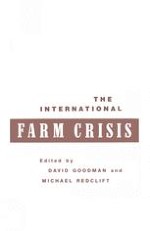1989 | OriginalPaper | Buchkapitel
Approaching Limits: Farming Contraction and Environmental Conservation in the UK
verfasst von : Clive Potter
Erschienen in: The International Farm Crisis
Verlag: Palgrave Macmillan UK
Enthalten in: Professional Book Archive
Aktivieren Sie unsere intelligente Suche, um passende Fachinhalte oder Patente zu finden.
Wählen Sie Textabschnitte aus um mit Künstlicher Intelligenz passenden Patente zu finden. powered by
Markieren Sie Textabschnitte, um KI-gestützt weitere passende Inhalte zu finden. powered by
European agriculture is finally encountering limits which have been anticipated for years, but inevitable for decades. The European Community’s Common Agricultural Policy (CAP) faces two separate but related crises, one budgetary, the other technological and economic. The first of these has long exercised the minds of policymakers, as farm spending has continued to outpace any expansion in the Community’s ‘Own Resources’. Yet this is merely a symptom of a deeper crisis, a crisis which has arisen because, in a fundamental sense, European agriculture is in long-term decline. The industry faces a level of consumer demand which is static or even declining for long term rather than cyclical reasons (Duchene et al., 1986). The fact is that despite an annual increase in output of up to 2 per cent since the early 1970s, internal consumer demand for most farm products has grown by a sluggish 0.5 per cent over the same period (EC, 1987). The CAP, by guaranteeing a market for everything farmers could produce, has effectively disguised this secular overcapacity beneath a dynamic of expansion. At considerable and mounting cost to consumers and taxpayers through intervention buying and export subsidies,it has artificially stretched the limits. Yet at the same time it has accelerated technological change in the industry by financing research and development, and furnishing a climate of security which has encouraged farmers to adopt highly productive farming techniques and new plant and machinery.
